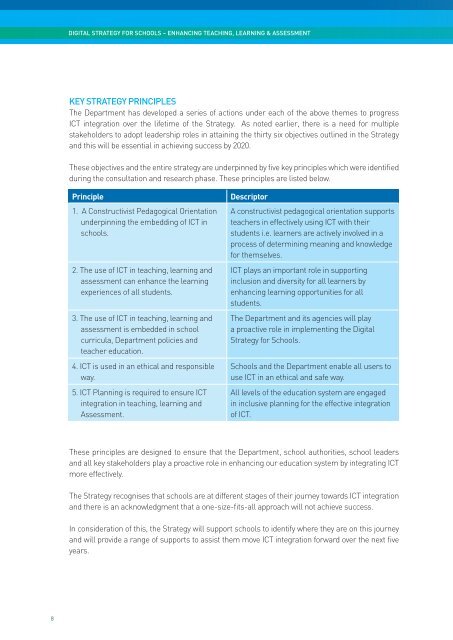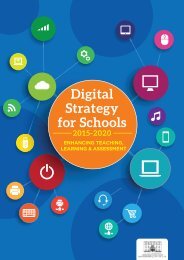Digital Strategy for Schools
TKmef
TKmef
Create successful ePaper yourself
Turn your PDF publications into a flip-book with our unique Google optimized e-Paper software.
DIGITAL STRATEGY FOR SCHOOLS – ENHANCING TEACHING, LEARNING & ASSESSMENT<br />
KEY STRATEGY PRINCIPLES<br />
The Department has developed a series of actions under each of the above themes to progress<br />
ICT integration over the lifetime of the <strong>Strategy</strong>. As noted earlier, there is a need <strong>for</strong> multiple<br />
stakeholders to adopt leadership roles in attaining the thirty six objectives outlined in the <strong>Strategy</strong><br />
and this will be essential in achieving success by 2020.<br />
These objectives and the entire strategy are underpinned by five key principles which were identified<br />
during the consultation and research phase. These principles are listed below.<br />
Principle<br />
1. A Constructivist Pedagogical Orientation<br />
underpinning the embedding of ICT in<br />
schools.<br />
2. The use of ICT in teaching, learning and<br />
assessment can enhance the learning<br />
experiences of all students.<br />
3. The use of ICT in teaching, learning and<br />
assessment is embedded in school<br />
curricula, Department policies and<br />
teacher education.<br />
4. ICT is used in an ethical and responsible<br />
way.<br />
5. ICT Planning is required to ensure ICT<br />
integration in teaching, learning and<br />
Assessment.<br />
Descriptor<br />
A constructivist pedagogical orientation supports<br />
teachers in effectively using ICT with their<br />
students i.e. learners are actively involved in a<br />
process of determining meaning and knowledge<br />
<strong>for</strong> themselves.<br />
ICT plays an important role in supporting<br />
inclusion and diversity <strong>for</strong> all learners by<br />
enhancing learning opportunities <strong>for</strong> all<br />
students.<br />
The Department and its agencies will play<br />
a proactive role in implementing the <strong>Digital</strong><br />
<strong>Strategy</strong> <strong>for</strong> <strong>Schools</strong>.<br />
<strong>Schools</strong> and the Department enable all users to<br />
use ICT in an ethical and safe way.<br />
All levels of the education system are engaged<br />
in inclusive planning <strong>for</strong> the effective integration<br />
of ICT.<br />
These principles are designed to ensure that the Department, school authorities, school leaders<br />
and all key stakeholders play a proactive role in enhancing our education system by integrating ICT<br />
more effectively.<br />
The <strong>Strategy</strong> recognises that schools are at different stages of their journey towards ICT integration<br />
and there is an acknowledgment that a one-size-fits-all approach will not achieve success.<br />
In consideration of this, the <strong>Strategy</strong> will support schools to identify where they are on this journey<br />
and will provide a range of supports to assist them move ICT integration <strong>for</strong>ward over the next five<br />
years.<br />
8




